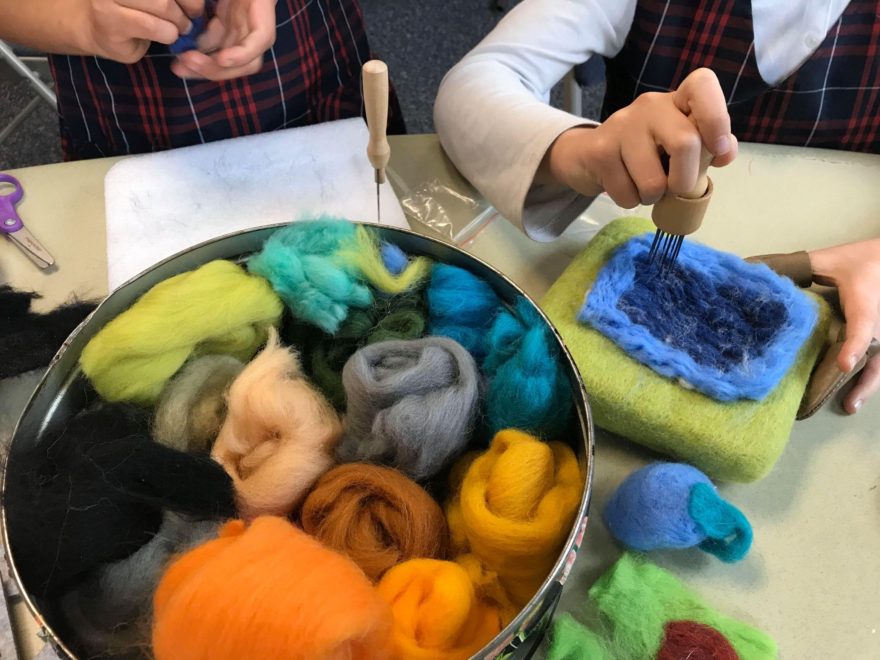Guest post by Joleen Steel, Classical Christian Educator and Director of Camping Stick Kids
We are what we repeatedly do; excellence, then, is not an act but a habit.
Aristotle
What do you find yourself repeatedly doing? In this digital world, it is easy to immerse ourselves in the repetition of scrolling through social media or clicking out words on a device in the hope of inspiring minds and garnering followers. Yet, the digital world falls short of satisfying our deepest longings for meaning and purpose. The best moments in life are not found on a screen, but in deep, meaningful relationships and the creation of beautiful and useful things.
So, find ways to repeatedly, purposefully foster the habits of relating and creating.

Though there is much to say on the subject of fostering healthy relationships, this article will focus on the habit of handwork. However, handwork need not be solitary. The art of creating alongside others brings a sense of community and comfort. Help your children foster sweet memories, giggling beneath blanketed forts or coloring comfortably together at the kitchen table. Develop bonds with your friends and family by asking them to join you in your creative endeavors.
As you work, ask yourself, “Who should join me?” Then, invite them. Teach them. Be together as you create and work with your hands.
Handwork as a Habit Leading to Wonder
Aristotle said that, “Good habits formed at youth make all the difference.” Because young children are like “tender reeds, ready to grow and easy to train,” the habit of working diligently with one’s hands ought to be taught to children as young as four years old.
Young children readily engage in tactile tasks such as building, painting, drawing and cutting paper. Turn their willing hands to tasks that require repetition and precision to create strong habits of attention and perseverance. This habit of attention will in turn create a sense of wonder as children discover the world around them.

Wisdom begins in wonder.
Socrates
Wonder is foundational to capturing a child’s attention. So begin with something that fills them with awe and awakens their desire to “make it too!” For example, a father using hammer and nail is likely to be interrupted by a child eager to practice what dad is doing. Soon father and child are happily hammering alongside one another.
The child’s wonder leads to wisdom as the skill of hammering in a nail requires a steady hand and focused attention.
From Wonder to Wisdom by Hand
Whether you are teaching woodworking or finger-knitting, log-splitting or sewing, the same path from wonder to wisdom is travelled. All these skills require repetition in order to achieve excellence.
Mistakes will happen. Problems will need to be resolved. Children who face these challenges develop grit and become stronger emotionally. Just listen for the happy little voice shouting, “I did it!” and you will be thankful you started the journey of handwork together.

A child who is busy with their hands is also busy with higher level thinking such as analysis, synthesis and evaluation. Analysis comes in the form of “what if” questions such as, “What if I use a different thickness of string in knitting, will my project look different?” Synthesis is when a child can defend their choices and discuss why they used a smaller nail for this project vs the larger one. In evaluation a child can construct and deconstruct their design and even change their opinion regarding the materials used, based on their experience.
Simple tasks, with little challenge may bring a quick smile, but immersing your child in a long-term project that requires deep thought will reap the rewards of confidence and character.
1 Thessalonians 4:11 encourages us
“to aspire to live quietly, and to mind [our] own affairs, and to work with [our] hands.”

So, turn off the technology and find some work for your hands to do. Lead yourself and your child into something creative and you may discover your side-by-side work evokes a calm, satisfying, joy-filled atmosphere that leads to habits of excellence.

About the Author
As a Classical Christian Educator, Joleen has had the joy of leading her young students to joyfully discover handwork that has a purpose.
As the director of Camping Stick Kids, Joleen enjoys writing, developing and marketing materials that will enable CSK to share the Gospel one camper at a time.
Download her free eBook Handwork with a Purpose!




Leave a Reply